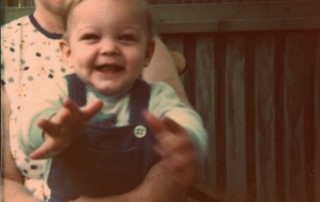Tim was four years old. His mom was a lot older than that. So was his dad. His brother Jeff was older too. Tim’s birthday was coming up soon. He knew exactly what he wanted. “I want a ladder for my birthday,” Tim told his mom. She didn’t hear because she was busy with “an important phone call”. Tim wondered why the phone call was so important. “I want a ladder for my birthday,” Tim told his dad. He didn’t hear because he was heading out the door to meet with “clients”. Tim wondered who “clients” was. “’Clients’ must be important too,” thought Tim. “I want a ladder for my birthday,” Tim told his brother Jeff. Jeff didn’t hear him because he was too busy ignoring everyone who wasn’t on TV. “I wish I was on TV,” thought Tim. At dinner, Tim told his parents, “I want a ladder for my birthday.” “That’s nice,” said his mom, who was reading a magazine about important people. “Hmmm,” said his dad, who was looking at something important on his computer. Jeff said nothing because Tim wasn’t on TV. Tim drew a picture of a ladder and colored it. He got some tape […]
A Control Budget: Picking Your Battles
Here’s an idea: We are all born with an instinct to resist other people’s attempts to control us. This instinct is designed to help us stay safe. To one extent or another, anytime something bad has happened in our lives, it is when we are not in control. The brain learns to associate this state of powerlessness with negative events, such as pain and danger. The greater the pain and danger associated with powerlessness, the greater the brain’s drive to avoid that state. In other words, with an awareness of the origins of this association, we can understand the reflexive statement, “you’re not the boss of me” in a whole new context. Negative events don’t just include instances of physical harm and danger, but also emotional harm and danger. To a young child, few things are as instinctively dangerous as disapproval from a caregiver or trusted loved one. Parental attempts to control, no matter how well intended, are usually rebuffed, especially as the child begins to develop a sense of self somewhere around 18 months old. This is what we refer to as the terrible twos. It’s not a coincidence that as the child learns that they can resist parental […]
Three Kinds of Procrastination and What to Do About Them: Part 3
Truth be told, even though these posts are all being published within a few days of each other, I originally started the series back in July. Don’t worry, three months is hardly even in the ballpark of my all-time record for procrastination. I once went seven years between journal entries. Anyway, I hope you’ve got something so far out of the series. Here’s the final instalment. 3. Defiance and Rebellion (Counterwill) Gordon Neufeld, child psychologist and author of the best-selling book “Hold On to Your Kids”, often refers to a natural, instinctive phenomenon which is known as counterwill. Simply stated, counterwill is the instinct to resist the efforts of others to control us. Neufeld demonstrates this instinct in his lectures by inviting an audience member to hold their hand up. He then pushes gently against their hand. As he does so, it is plain to see that, without any thought, the audience member instinctively pushes back. As I said before, counterwill is an instinctive response. However, it may grow much stronger in unhealthy environments. If you are a child who is overly controlled by a parent or authority figure, you may adapt by acquiescing and completely abandoning your own will […]







Recent Comments